Jim Sabol / Photos by the author
If all your trains do is run around in a circle, a layout the size of an airplane hangar will soon leave you bored and looking for another hobby. But if you emulate Brian Ferris and convert even a modest-sized room into an actual railroad (just smaller), you will have a hobby for a lifetime of interest and enjoyment.
Brian’s HO Port Townsend Southern, Third Subdivision, occupies a spare room about 12’x20′ in the Ferris home in Olympia. The PTS is point-to-point (no loop) 54.7 theoretical miles from Centralia to Tacoma, with branches to Union Mills and Maytown, all in Western Washington.
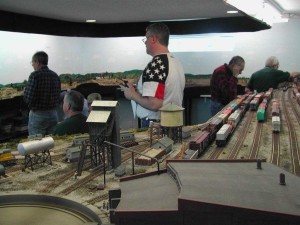
The busy engine terminal and classification yard are designed to receive, classify, block, and dispatch an efficient flow of freight traffic over the road
Recently, a road superintendent, a dispatcher, a pair of yardmasters, three teams of engineer/conductors, and two station agent/operators combined to move three first class passenger trains, a second class freight, plus eight extra trains and a logger over the main and branches, originating like magic through a hole in the wall leading to staging tracks in the adjacent garage that represented the terminals at Centralia and Tacoma.
As with big brothers NP, UP, GN, and Milw—whose trains regularly use PTS rails as a bridge line–emphasis is strongest on safety for employees and passengers, reliable on-time performance for customers, and meticulous care for company equipment and infrastructure. First time operator Tom Murphy said, “I had no idea that operating a model railroad as much as possible like a full-sized railroad could occupy a person for four hours with no sign of boredom!”
Operators’ Duties on the PTSRR, 3rd Sub
Superintendent
- Create master timetable
- Monitor progress of all trains and safe operation of subdivision
Dispatcher
- Monitor safe and on-time movement of all trains in subdivision per timetable
- Record movement of all trains in subdivision
- Authorize agent/operators to issue clearance cards for all scheduled and extra trains
- Authorize extra trains
- Authorize #19 orders (for special movements) of trains
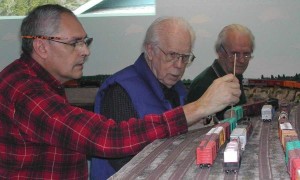
Yardmasters Robert Grove and Charles Ricketts break down arriving freight #674 prior to blocking southbound local #703 for Engineer Jim Elder
Yardmasters
- Prepare yard to receive arriving freight trains.
- Classify and block arriving cars for forwarding on departing freight trains
- Manage safe and efficient operation of arriving, departing, and switching locomotives within yard limits
Station Agent/Operators
- Issue clearance cards for all scheduled departing trains on confirmation from dispatcher
- Issue #19 orders as instructed by dispatcher
- Register names of crew and train numbers for all arriving and departing trains
- Advise dispatcher of all arrivals and departures
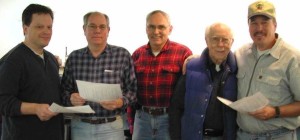
Conductors Mike Davison, Scott Buckley, and Ry Bates (with order sheets) go over schedules with yardmasters Robert Grove and Chuck Ricketts
Conductors
- Verify wheel report (number and identity of all cars in train)
- Obtain clearance card from stations agent/operator, confer with engineer
- Plan any switching moves with engineer
- Monitor on-time and safe operation of train at all points at all times
- Protect train from all directions in case of failure to maintain schedule
- Advise dispatcher immediately upon failure to maintain schedule.
Engineers
- Verify readiness of motive power assigned to train
- Confer with conductor regarding correct current time, timetable, and authority to proceed
- Confer with conductor on all switching moves
- Conduct sanding brake test (operation of DCC throttle)
- Conduct running brake test (verify all cars coupled, DCC brake)
- Operate train over the road safely per timetable, speed limits, and special orders
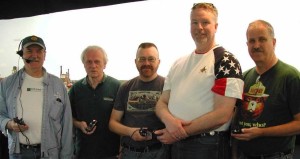
Station Agent Greg Arndt coordinates throttle settings with engineers Jim Elder, Allan Manson, Clint Brown, and Tom Murphy
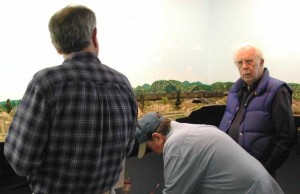
Station agent Arndt issues a Form 19 order authorizing Scott Buckley’s extra train to meet and pass an opposing extra by virtue of superiority of direction (northbound per company rules) while Enforcer Chuck Ricketts looks on.
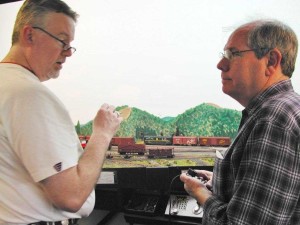
Conductor Clint Brown coordinates heavy switching moves at Union Mills with engineer Scott Buckley. Both boys play nice together which is good . because the mill here is a major shipper on the Port Townsend Southern.
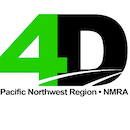
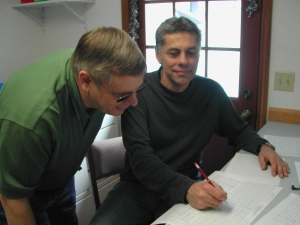
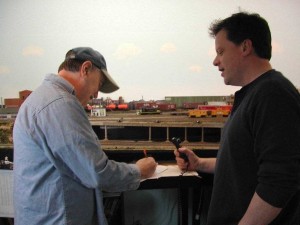
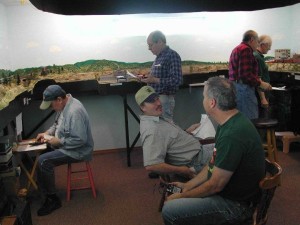
No Comments Yet